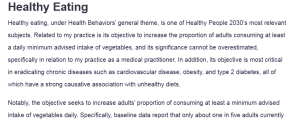Healthy Eating
Healthy eating, under Health Behaviors’ general theme, is one of Healthy People 2030’s most relevant subjects. Related to my practice is its objective to increase the proportion of adults consuming at least a daily minimum advised intake of vegetables, and its significance cannot be overestimated, specifically in relation to my practice as a medical practitioner. In addition, its objective is most critical in eradicating chronic diseases such as cardiovascular disease, obesity, and type 2 diabetes, all of which have a strong causative association with unhealthy diets.
Notably, the objective seeks to increase adults’ proportion of consuming at least a minimum advised intake of vegetables daily. Specifically, baseline data report that only about one in five adults currently consume at least that, and Healthy People 2030 sets its target for considerable improvement (Office of Disease Prevention and Health Promotion, 2024). Currently, its status is “Improving,” for overall diets, in general, are trending in a positive direction, but at a slow and steady pace, with increased awareness and increased intake of diets high in fruits and vegetables.
From a practice perspective, such an objective intersects with that of medical providers in advising patients about preventive care, including nutrition. In my practice, I regularly have at-risk individuals who could use an increase in the consumption of vegetables for developing diseases. As argued by Wallace et al. (2020), advising patients about a balanced diet, with a specific increase in consumption of vegetables, can have a direct impact in terms of improving health outcomes.
Besides, social factors in terms of access to fruits and vegetables, for example, have to be addressed to overcome healthy eating barriers, particularly in disadvantaged communities (Flaubert et al., 2021). Healthcare professionals and nurses can play a proactive role by providing information, providing individualized nutrition guidance, and collaborating with nutritionists to support such messages.
In summary, healthy eating through increased vegetable consumption is an important part of reducing the burden of disease and improving public health. By employing evidence-based interventions to improve diets, medical professionals have an important role in supporting individuals in achieving such objectives and improving overall health outcomes.
References
Flaubert, J. L., Menestrel, S. L., Williams, D. R., & Wakefield, M. K. (2021). Social determinants of health and health equity. In www.ncbi.nlm.nih.gov. National Academies Press (US). https://www.ncbi.nlm.nih.gov/books/NBK573923/
Office of Disease Prevention and Health Promotion. (2024). Healthy People 2030. Health.gov. https://odphp.health.gov/healthypeople
Wallace, T. C., Bailey, R. L., Blumberg, J. B., Burton-Freeman, B., Chen, C-y. O., Crowe-White, K. M., Drewnowski, A., Hooshmand, S., Johnson, E., Lewis, R., Murray, R., Shapses, S. A., & Wang, D. D. (2020). Fruits, vegetables, and health: A comprehensive narrative, umbrella review of the science and recommendations for enhanced public policy to improve intake. Critical Reviews in Food Science and Nutrition, 60(13), 1–38. https://doi.org/10.1080/10408398.2020.1632258
ORDER A PLAGIARISM-FREE PAPER HERE
We’ll write everything from scratch
Question
Module 2 – Discussion Topic 2
Healthy People 2030 is the fifth version of the Healthy People initiative and builds on knowledge acquired over the past four decades. The Healthy People 2030 objectives are organized by the following topics: Health Conditions, Health Behaviors, Populations, Settings and Systems, and Social Determinants of Health. Each topic includes a list of relevant objectives.
- Describe a topic and associated objective from Healthy People 2030 that interests you.
- Discuss how it relates to your professional practice.
- Include in your discussion the status of the objective (Baseline only, Target met or exceeded, Improving, Little or no detectable change, Getting worse).
- View your peers’ discussion post and click “Like” if you might consider using that topic in your practice as well. Response posts are not required, but your peers would certainly appreciate any feedback.
Reminder: For each of the discussions, you have a discussion board rubric that identifies how your work will be graded. To view this Rubric, before submitting your work, simply select the drop box menu (three dots on the top right of this page) and “Show Rubric.”

Healthy Eating
Scholarly Sources: Only scholarly sources are acceptable for citation and reference in this course. These include peer-reviewed publications, government reports, or sources written by a professional or scholar in the field. For the discussions, reputable internet sources such as websites by government agencies (URL ends in .gov) and respected organizations (often ends in .org) can be counted as scholarly sources.
The best outside scholarly source to use is a peer-reviewed nursing journal. You are encouraged to use the UNA library and search one of the available databases for a peer-reviewed journal article. The following sources should not be used: Wikipedia, Wikis, or blogs.
These websites are not considered scholarly as anyone can add to these. Current outside scholarly sources must be published within the last 5 years. Instructor permission must be obtained BEFORE the assignment is due if using a source that is older than 5 years.

